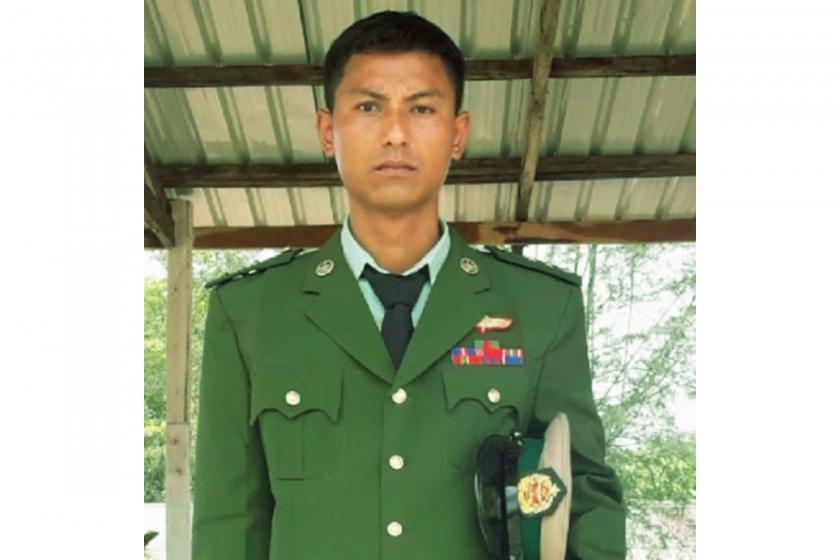
An army major who recently broke rank has described Myanmar’s military as an institution rife with rank- and class-based discrimination, a reality that he said had made soldiers consider defecting prior to the February 1 coup.
Major Hein Thaw Oo, of the Meikhtila-based Light Infantry Division (LID) 99, was the highest-ranking known defector from the military at the time of reporting.
He abandoned the military after 20 years and joined the anti-junta Civil Disobedience (CDM) on March 24.
A native of Magwe Region and a 2002 graduate of the 48th intake of the Defence Services Academy, the major had been stationed on the frontline in Lashio, northern Shan State. There, LID 99– whose soldiers are among the military’s “shock troops”– is known to have engaged in brutal clashes with ethnic armed organisations based in the region.
“In the military, for whatever reason, you’re always scared of anyone who has a higher rank than you,” Hein Thaw Oo told Myanmar Now.
“It doesn’t feel like a military. It’s almost like there’s a system of monarchs and slaves,” he added.
The major said that the military “alienated” anyone who questioned the institution or its practises.
“It’s not just now, it has always been this way. If they don’t get along with you, you’re pushed aside. Not only that, you get in trouble,” he explained.
Those who, like him, have defected from the military and police are largely sheltering in areas controlled by ethnic armed organisations.
Hein Thaw Oo insisted there are more who want to defect, “from sergeants on upward.”
“If you don’t believe it, go ask them. If you ask them if they want to get out, they’d get out, dancing,” the major said.
The major said that he planned to undertake a temporary monkhood, and would later join a federal army to fight against the junta’s armed forces.
At least 739 civilians have been killed nationwide by the military regime during Myanmar’s anti-dictatorship Spring Revolution since the February 1 coup, according to the Assistance Association for Political Prisoners, a group which has been monitoring the violence.
On April 9 alone, more than 80 civilians who were protesting peacefully in Bago were murdered during a crackdown by the junta’s armed forces that involved the use of heavy artillery.
Hein Thaw Oo told Myanmar Now that the suppression of public opposition at these demonstrations has been directly ordered by military strategists from the junta’s Ministry of Defence in Naypyitaw.
Military officers consider protest sites to be battlefields, and ignore when lower ranking soldiers loot homes or commit robberies and extortion, he explained.
“I assume they’re giving these orders so that they can let the soldiers on the ground just roam freely and do what they want,” the major said, adding that this was how the military treated conflict areas.
Dr. Lian Hmung Sakhong, the federal union affairs minister with the newly formed interim cabinet of the Committee Representing Pyidaungsu Hluttaw (CRPH), recently said that he believed there were more officers who would leave if given the chance.
The cabinet, known as the National Unity Government (NUG), urged military and police to defect and stand with the public at an NUG press conference on April 16.
Dr. Lian Hmung Sakhong invited military officers he came to know during his work on peace negotiations between the Myanmar army and ethnic armed organisations to join the CDM.
“Don’t follow [military chief] Min Aung Hlaing, follow justice and truth,” he said at the press conference, addressing those still serving in the regime’s armed forces. “Join us in building a society where everyone treats each other with humanity.”
Although there are soldiers who are dissatisfied with the military coup, chances of a mutiny depend on the NUG’s governing capacity, Major Hein Thaw Oo told Myanmar Now.
Captain Htun Myat Aung, a 15-year veteran of Myanmar’s military and another recent defector, said the same. He was among those whom Myanmar Now spoke to who speculated that other soldiers were waiting to see the NUG’s next moves before abandoning the armed forces.
“The military has been broken for a while. But they’ve instilled so much fear [in soldiers] that it would take a big spark that could combat this,” he said.



